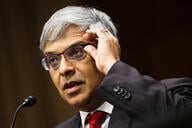You have /5 articles left.
Sign up for a free account or log in.
The images above both circulated widely on social media Sunday afternoon, documenting rallies -- one in Cambridge and one in Boston -- about the trial officially starting today on whether Harvard University discriminates against Asian American applicants.
The Boston rally attendees -- most of them Asian Americans and affiliated with a number of Asian American groups -- spoke in favor of the lawsuit charging Harvard with illegal discrimination. Asian Americans (judging by numerous polls) are divided on affirmative action, with some seeing it costing their sons and daughters slots at elite colleges, and others noting the benefits it provides to many Asian Americans who do not fit the stereotype of having already achieved academic and economic success.
The banner above on the right noted the appreciation of some Asian Americans for President Trump, whose Justice Department has backed the lawsuit and started an investigation of Yale University over similar policies.
The banner certainly reflects the views of those who held it up, but it also played into a message of supporters of affirmative action. They have said repeatedly that the goal of the lawsuit is not to help Asian Americans, but rather to make it impossible for colleges to consider race or ethnicity in admissions at all -- even though such a ban would likely lead to sharp declines in black and Latino enrollment at colleges that are highly competitive in admissions. (Other banners at the Boston rally tried to link the lawsuit to civil rights fights of earlier eras, with many signs saying, "I have a dream.")
Some scuffles were reported at the Boston rally, with some organizers reportedly unhappy about having their case linked to the Trump administration.
Indeed at the rally in Cambridge -- by Harvard students and alumni defending the university's position -- chants were made not against Asian Americans, but against Edward Blum, the strategist behind the lawsuit from Students for Fair Admissions. He has also been a force behind past efforts to get federal courts to limit colleges' consideration of race. And many assume that is his goal. And with Anthony Kennedy no longer on the Supreme Court, most legal observers do not see five votes there to preserve the status quo on race and admissions.
A central message of the Coalition for a Diverse Harvard, which organized the Cambridge rally, was that many Asian Americans are enrolled at Harvard and back the university's consideration of race in admissions. The university has noted repeatedly that Asian enrollments have increased over the years, and are far larger than the Asian share of the U.S. population. The photo above at left features the diversity reflected at the Cambridge rally.
Another theme at the rally defending affirmative action was that California and other states that have barred consideration of race by public universities have seen dramatic drops in the admission of black and Latino students after instituting such bans.
While Latino numbers at University of California campus have since gone up dramatically, they have not kept pace at the Berkeley and Los Angeles campuses with the growth of the state's Latino population, and black enrollment has been largely stagnant.
The speeches at the two rallies didn't break new ground, but the politics of affirmative action are increasingly seen as a "wedge issue" -- a phrase that once referred to ways to dislodge working-class white people from the Democratic electorate, but that now refers to Republican attempts to woo Asian American voters, who have historically leaned toward Democratic candidates.
Corey Stewart, the Republican candidate who is challenging the re-election of U.S. senator Tim Kaine of Virginia, held a press conference last month in a Vietnamese American neighborhood to say that, if elected, he would introduce legislation to bar colleges receiving federal funds (essentially all colleges) from considering the race or ethnicity of applicants or students.
The Washington Post quoted him as saying, “I don’t think that anybody should be punished because of their race … We know that quotas are illegal under the Constitution.” (That quotas in admissions are illegal isn't in dispute, but Harvard and other colleges maintain that their consideration of race and ethnicity is part of an admissions process that looks at a range of applicant qualities, without quotas.)
Stewart is raising the issue of what sees as racial discrimination despite scrutiny of his campaign's ties to white supremacists and their supporters.
Kaine is considered a strong favorite in his race.
But the issue is also being raised by a Republican incumbent, Representative Mimi King, who is in a tough re-election battle in her Orange County, Calif., district, in part because a growing population of Asian Americans has been wooed by Democrats.
Politico reported that King recently sent out a mailer focused on the Yale investigation by the Justice Department and calling for a House of Representatives investigation into “discrimination against Asian-American students at Ivy League and other top universities.”




